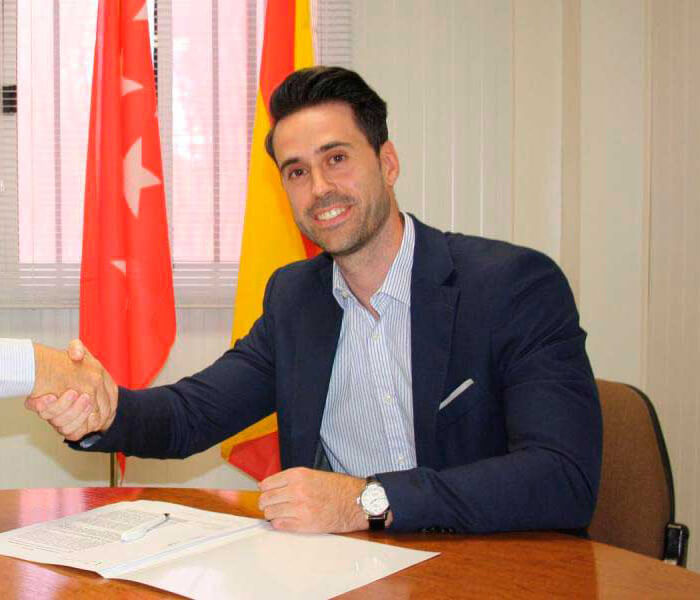Divorce lawyers in Spain play a crucial role in providing legal guidance during the separation process in our country. They offer personalized advice tailored to the specific needs of each client, along with negotiation skills and emotional support. Understanding divorce procedures, including the types of divorce and the requirements for filing, is essential. Additionally, Calderón Corredera Abogados stands out for its expertise in divorce cases and its effective handling of language barriers.
The Role of Divorce Lawyers in Spain
Divorce lawyers play a vital role in the complex separation process. Their expertise is key to guiding those involved through the various legal and emotional aspects related to divorce.
Personalized Legal Advice
Evita conflictos jurídicos innecesarios y resguarda tus intereses con nuestro asesoramiento legal
un equipo de expertos te esta esperando
Personalized legal advice is one of the main functions of a divorce lawyer. Each situation is unique, requiring an approach tailored to the specific circumstances of the client. Lawyers analyze the individual context of each case, providing clear recommendations on available legal options and the potential consequences of each decision.
This advice focuses not only on legal aspects but also considers the personal wishes and concerns of each client. Different legal strategies are explored, evaluating aspects such as:
- Child custody.
- Division of assets.
- Spousal and child support.
By providing this type of advice, lawyers help clients make informed decisions that align with their interests.
Negotiation Skills
Negotiation skills are crucial in the field of divorce. Lawyers act as mediators, aiming to reach agreements that avoid prolonged and costly legal disputes. Effective negotiation can lead to a mutually agreed settlement, benefiting both parties and reducing emotional strain.
During negotiations, lawyers address sensitive issues such as:
- Custody and visitation agreements.
- Distribution of assets and debts.
- Economic compensation and support payments.
The ability to negotiate effectively helps achieve solutions that meet the clients’ needs, fostering a more harmonious outcome in the separation process.
Emotional Support During the Process
The divorce process can be emotionally draining. Lawyers not only offer legal advice but also provide significant support during this challenging period. Their presence helps clients find stability in times of uncertainty.
This support is manifested in several ways:
- Advice on how to handle emotional challenges.
- Availability to listen to concerns and fears.
- Guidance on additional resources such as therapy or support groups.
Recognizing that divorces are processes in which emotions play a vital role allows divorce lawyers to support their clients with greater empathy and understanding.
Divorce Procedures in Spain
Divorce procedures in Spain are regulated by the Civil Code and have been simplified to facilitate access to justice. Below, we outline the types of divorce, the necessary requirements, and the procedures for filing for divorce.
Types of Divorce
In Spain, there are mainly two types of divorce, each with its own characteristics and procedures.
Contentious Divorce
A contentious divorce occurs when one of the parties disagrees with the decision to separate or with the terms of the divorce. This type of divorce can result in a lengthy and complicated process, as it involves the intervention of a judge to resolve disputes over child custody, asset division, and other issues. It usually requires multiple hearings and the presentation of evidence and testimonies.
Mutual Agreement Divorce
A mutual agreement divorce, also known as an amicable divorce, is characterized by the consensus between both parties on the terms of the separation. This type of divorce is faster and less conflictive, as the parties sign a regulatory agreement that includes, among other things, provisions on child custody and the division of assets. The filing process for this type of divorce in court can be more straightforward.
Requirements for Filing for Divorce
To initiate the divorce process in Spain, certain requirements must be met:
- The spouses must have been married for a minimum period of three months.
- No specific reason is required to request a divorce, as Spain allows for no-fault divorce.
- It is advisable to seek legal advice to properly prepare the necessary documentation.
Procedures for Filing a Divorce Petition
The process for filing a divorce petition varies depending on the type of divorce. Below are the general steps:
For contentious divorce, the procedure includes the following steps:
- Filing the petition at the corresponding Court of First Instance, accompanied by the necessary documentation.
- Receiving the response from the other spouse, who can either accept or defend their position.
- Holding hearings and possible conciliations until reaching a final verdict from the judge.
In the case of mutual agreement divorce, the procedure is usually more agile:
- Preparation and signing of the regulatory agreement by both parties.
- Joint submission of the petition to the competent court, along with the agreement and additional documents.
- Resolution by the judge, who can simply ratify the agreement.
Descubre cómo podemos proteger tus intereses con nuestro asesoramiento legal preventivo
Once the procedure is launched, it is essential to carefully follow each step and meet the established deadlines to ensure the process develops as efficiently as possible.
Child Custody and Maintenance in Spanish Divorce Law
Child custody and maintenance obligations are crucial aspects addressed during a divorce process in Spain. The law prioritizes the welfare of minors, aiming to establish agreements that protect their interests.
Custody Arrangements
Custody arrangements determine with whom the children will live after the divorce. Decisions in this area are governed by the principle of the child’s best interests and may vary according to the specific situation of each family.
Exclusive Custody
In exclusive custody, one parent has the primary responsibility of caring for and raising the children. This type of custody is generally granted when it is considered the best option for the child, whether due to stability, proximity to the parent’s support network, or the other parent’s situation, which may be unsuitable.
Shared Custody
Shared custody means that both parents equally share the responsibility of raising and caring for their children. This model promotes the active participation of both parents in the children’s lives and has become increasingly common in Spanish judicial practice, as long as it respects the best interests of the children.
Child Maintenance Obligations
Maintenance obligations are essential to ensure the support of children in the event of their parents’ separation. The non-custodial parent is usually required to provide financial contributions to cover the basic needs of the children, such as food, education, and health.
In Spain, the amount of this maintenance is determined based on the parent’s income and the child’s needs, and it is typically set as a percentage of the income, ranging from 15% to 40%.
Legal Protection of Minors
Spanish law includes mechanisms to safeguard the rights of minors during the divorce process. The intervention of a public prosecutor is mandatory in cases where there are custody conflicts, ensuring that the child’s interests are adequately assessed.
Courts prioritize the welfare of minors and seek solutions that promote their emotional and psychological stability, as well as their relationship with both parents, as long as it benefits their overall development. Decisions are made after considering all relevant circumstances.
Division of Assets and Financial Obligations
The division of assets and financial obligations are fundamental aspects of the divorce process. This can become complex, as each couple may have different economic regimes and financial situations. Understanding how this division will take place is crucial to ensure a fair and balanced separation.
Marital Economic Regimes
In Spain, there are two main economic regimes that determine how assets are managed during the marriage and, consequently, how they are divided upon divorce. These are the community property regime (bienes gananciales) and the separation of property regime.
Community Property Regime
In this regime, all assets acquired during the marriage are considered community property, regardless of who purchased them. Upon the dissolution of the marriage, these assets are divided equally between both spouses. However, there are exceptions to consider, such as:
- Personal assets, which include those acquired before the marriage or received as inheritance or gifts.
- Debts incurred by one spouse without the consent of the other, which are not considered community property.
Separation of Property Regime
This regime allows each spouse to maintain exclusive ownership of the assets acquired before and during the marriage. In other words, the assets are managed independently, and each is responsible for their own debts. In the event of a divorce, no division of common assets occurs, as there are none.
This regime is common in cases where one spouse owns a business or when maintaining financial independence is desired. The choice of regime must be formalized before a notary and can be revised through prenuptial agreements.
Considerations Regarding Compensatory Pension
The compensatory pension is a right that may arise based on the economic circumstances of the spouses at the time of separation. It aims to balance economic inequalities that may arise after the divorce, particularly for the spouse in a less favorable financial position.
- Factors such as the duration of the marriage, the economic situation of each spouse, and their dedication to household tasks and childcare are considered by the judge.
- The pension can be temporary or indefinite, depending on the needs of the affected spouse and the specific circumstances of the case.
Division of Joint Properties
When a couple owns joint properties, dividing these can become a point of contention during the divorce. Several aspects are considered in this context:
- Valuation of the assets: The fair market value of the properties must be determined to establish a solid basis for the division.
- Distribution options: The spouses can agree to sell the property and divide the proceeds, or alternatively, one spouse can choose to buy out the other’s share.
Engaging specialized lawyers is advisable to facilitate this division and ensure that both parties’ rights are respected during the divorce process.
International Divorce Considerations
International divorce involves various legal aspects that can complicate the process. Cases with transnational elements require specific knowledge of the law in Spain and how interact it.
Jurisdictional Issues
Jurisdictional problems are common in divorces involving multiple nations. Determining which court has jurisdiction can be a significant challenge. Factors to consider include:
- Residence of the involved parties.
- Place where the marriage was celebrated.
- Where the children reside, if applicable.
- Any significant ties to a specific country.
Depending on the circumstances, a divorce could become complicated if requests are filed in different countries, potentially leading to conflicting decisions. Therefore, it is crucial to have guidance from lawyers specialized in family law in Spain.
Legal Certificates and Documentation
Handling legal documentation is essential for the validity of the divorce procedure. This includes obtaining necessary legal certificates, which can vary by jurisdiction. Frequently required documents include:
- Marriage certificate.
- Children’s birth certificates.
- Proof of residence and nationality.
Correct translation and legalization of these documents can be critical in avoiding legal issues. Differences in legislation may necessitate compliance with additional requirements or presenting information in a specific format, highlighting the importance of legal expertise.
Divorce Lawyers in Madrid
Geographical location can affect the choice of a divorce lawyer. Having a professional who knows local laws and is familiar with the functioning of courts is crucial in this process.
Madrid, as one of the largest and most populous cities in Spain, offers a wide range of legal services in the field of divorce. Lawyers in this city are familiar with the specificities of legislation and the dynamics of family courts.
- The diversity of experiences and approaches allows clients to choose among lawyers who specialize in different aspects of family law.
- It is common to find lawyers who offer a comprehensive service, covering everything from divorce to child custody and asset division.
- The use of translation tools facilitates communication with clients who prefer to speak in a language other than Spanish if necessary.
Divorce Lawyers Near Me
Finding a local divorce lawyer is key for many people seeking legal assistance. The search can be based on recommendations, reviews, and the experiences of other clients in the local area.
- Local lawyers have a better understanding of the judicial mechanisms in the area and can provide a more personalized service.
- Proximity allows for more fluid communication and the possibility of regular meetings, which can be beneficial in complex processes.
- It is advisable to research the credentials and specialization of lawyers to ensure they fit the specific needs of the case.
Legal Perspectives and Relevant Jurisprudence
Legal perspectives in the field of divorce in Spain are constantly evolving. Each legislative change and relevant court ruling significantly impacts the practice of family law.
Legislative Updates in Family Law
In recent years, several legislative reforms have modified key aspects of family law, particularly the divorce process. These updates aim to adapt to social realities and the needs of citizens. Among the most significant are:
- Reforms that simplify divorce procedures, allowing couples to manage their separations more efficiently.
- The introduction of measures that promote shared custody, prioritizing the well-being of minors and ensuring a meaningful relationship with both parents.
- Changes in the criteria for assigning child support that seek to balance economic responsibilities between parents.
Spanish legislation continues to evolve, and it is important for legal professionals to stay informed about these changes to provide appropriate advice to their clients.
Relevant Cases and Their Impact
Jurisprudence plays a crucial role in interpreting divorce laws. Various court rulings have set precedents that influence future cases. Some of the most important cases include:
- Rulings that clarify the definition of shared custody and the criteria judges must consider when making decisions.
- Decisions on the conditions for granting child support, setting guidelines on how it should be calculated based on parents’ income and children’s needs.
- Resolutions addressing the division of assets in marital regimes, highlighting the importance of transparency and documentation in proving asset ownership.
These rulings not only set legal precedents but also reflect a shift in social perceptions of divorce and its implications.
Additional Legal Services in Divorce Cases
Additional legal services are essential for addressing complementary aspects that may arise during the divorce process. These services can facilitate conflict resolution and protect rights in various circumstances.
Prenuptial Agreements
Prenuptial agreements are contracts that future spouses can sign before marriage. In the field of family law in Spain, these agreements aim to establish rules on the distribution of assets and responsibilities in the event of a possible separation or divorce. Key points to consider include:
- Asset Protection: They allow the parties to protect their individual assets, preventing them from being considered marital property.
- Establishment of Conditions: Conditions on maintenance or compensatory pensions can be defined, ensuring that both parties are aware of their rights and duties.
- Facilitation of Understanding: By clarifying expectations and obligations, prenuptial agreements can reduce conflict in the future.
Drafting these agreements requires the intervention of a specialized lawyer to ensure they are legal and fair. Proper advice is crucial to address potential future scenarios.
Translation and Communication Services in English
In an increasingly international environment, translation and communication services are essential, especially in the legal context. A lawyer must be able to communicate clearly to ensure that all parties understand the process and their rights. Key points include:
- Translation of Legal Documents: It is essential that all documentation submitted in proceedings is accurate and understandable, including the translation of agreements and rulings.
- Effective Communication: For those who do not speak Spanish, having appropriate translation services can reduce anxiety and avoid misunderstandings during negotiations or trials.
- Facilitation of Cultural Understanding: Translation services not only address language but also help to understand cultural differences that may influence the legal process.
The use of translation tools are measures that ensure smooth communication and that decisions are made with all available information.
How to Select the Best Divorce Lawyer for Your Needs
Choosing the right divorce lawyer is key to ensuring that the legal process is handled in the best possible way. Experience, approach, and communication skills are fundamental aspects to consider.
Criteria for Evaluating a Divorce Lawyer
When looking for a divorce lawyer, it is essential to consider several criteria that can make a difference in resolving the case. Some of these criteria are:
- Experience in Family Law: Verify that the lawyer has a strong track record in divorce and family law cases.
- Specialization: Confirm whether the lawyer specializes in complex divorces, custody disputes, or asset division.
- Reputation: Research other clients’ opinions and consult reviews to better understand their professional performance.
- Transparency in Fees: Clarify how fees are structured and if there are additional costs that may arise during the process.
- Communication Skills: Evaluate whether the lawyer can explain legal issues clearly and comprehensively.
Legal Experience vs. Language Barrier
The language barrier can be a significant challenge in the divorce process, especially in an international context. However, a lawyer’s legal experience in this field can overcome any linguistic difficulty. Considerations include:
- Language Proficiency: Although the lawyer may have a good command of legal English, translation tools may be necessary in complex conversations.
- Communication Management: A lawyer who can handle document translation and effective communication in both languages can be a great asset.
- Cultural and Legal Context: Experience in family law in Spain is key, as legal and cultural dynamics can influence the case, even if language barriers are present.
If you are navigating the complexities of divorce in Spain and need professional legal assistance, our team is here to support you. An experienced divorce lawyer can make a significant difference in ensuring your rights are protected throughout the process. Don’t hesitate to reach out—contact us through our contact form or email us directly at info@calderoncorredera.com for personalized guidance and representation in Spanish courts. Let us help you manage your case with the expertise and care you deserve.







